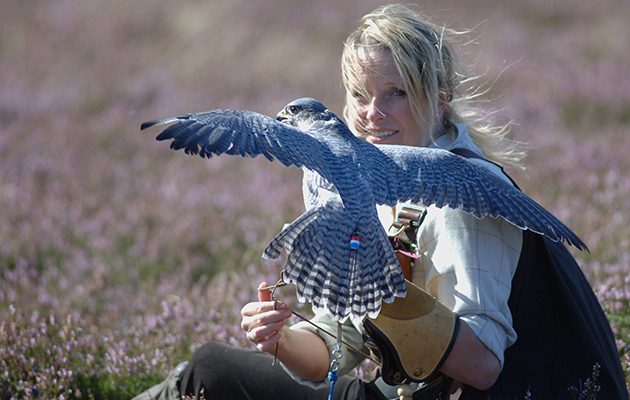A childhood love of garden birds manifested into a career in falconry – and the chance to develop a passion for other fieldsports
From nursing sick birds as a child to opening the first dedicated falconry school in the world, Emma Ford’s childhood enthusiasms have developed into a love for many fieldsports.
For more Sporting Dianas, seriously sporting ladies offering advice and encouragement, Joint Master of the Bicester Lucy Holland is as happy on a skeleton run or grouse moor as she is in the saddle. And The Countess of Lucan’s latest sporting endeavour is a country clothing line.
EMMA FORD
I always maintain that if you love any sports afield there is no limitation to those you will try your hand at, although, depressingly, there is no guarantee that you will be as proficient in the new disciplines as you are in your core one. I fear I am a case in point. My core skill is falconry – by definition, the use of trained birds of prey to catch wild game.
I have tried to become accomplished in other fieldsports but, I have to admit, with varying degrees of proficiency.
My parents divorced when I was six years old and I moved with my mother to the carpenter’s cottage on the edge of the Chilham Castle estate in Kent. I had always been fascinated with birds and had nurtured anything sick or injured in a box under my bed. Some waifs and strays – mostly victims of the family cats – survived and it filled me with joy to see those I could release in restored health soaring into the skies.

Always interested in birds, Emma nursed sick or injured birds in a box under her bed as a child.
This vicarious thrill, instilled during childhood, has never left me. When new neighbours moved into the farmhouse next door to us at Chilham, as an inquisitive eight-year-old I peered over their garden wall – and came eyeball to eyeball with a trained falcon. I was hooked. My mother recognised that this was the igniting of a passion in me that was destined to burn brightly throughout my childhood and into adult life. She allowed me to keep various hawks while I was at school and the falconer next door taught me how to train them.
Falconry was relatively rare at that time in the UK but, by a bizarre twist of fate, I met my future husband, Steve, who was also a falconer, when I was 14. Both of us had been fortunate enough to learn from experienced falconers but we realised that there was no easy way for anyone interested in falconry to learn the art. We decided to offer falconry courses, which initially operated out of my long-suffering mother’s back garden. We were surprised by the number of people who wanted to take a course – all of them saying that they had always been fascinated by falconry but had no way of learning about it other than from books, many of which dated back through the centuries. Encouraged, we took a chance and opened the first dedicated falconry school in the world. The British School of Falconry soon attracted students from around the world.
In 1992, we relocated to Scotland, where Gleneagles Hotel offered us a permanent base. The move afforded me the opportunity to try my hand at a number of fieldsports, including fishing and shooting. I was not talented with a rod, lacking the patience, but I loved shooting and was fortunate enough to get some lovely invitations, shooting driven grouse, partridge, duck flighting and pheasant throughout the season and bobwhite quail in Georgia, USA. My shooting ability has never matched my aspirations and to begin with, being the only woman on the line, I felt self-conscious about missing but I persisted and gradually became more proficient, managing sometimes to pull off shots that my friend, Lucy King, aptly described in an article as “bath birds”. There are few things more pleasurable than soaking in a warm tub, with a gin and tonic at your elbow, reflecting on a shot that you know you will remember for the rest of your days.

Emma opened a gundog school at Gleneagles in 2007 and teaches guests how to handle the kennel of fully trained labradors.
Over the years my sporting endeavours have been greatly enhanced by dogs. Each year Steve and I take a moor for grouse hawking, flying falcons over pointers and setters. We’ve always had labs, too, and for me having a peg dog doubles the pleasure of shooting. Spurred on by the success of the falconry school, we suggested to Gleneagles that a gundog school might be a great addition to their portfolio. This we established in 2007, teaching guests how to handle our kennel of fully trained labradors.
I have been incredibly fortunate to make a career out of the sporting pastimes that I love so much. Along the way I’ve been asked to write eight books and Steve and I have opened schools in America, including a falconry school in Vermont and fly-fishing schools in Vermont and Wyoming. Above all, I’ve learned that sharing your passion for a sport greatly enhances your own pleasure and in a fast-moving, IT-driven world, it’s wonderful to have the opportunity to promote the simple pleasures of field and stream to the next generation.
TOP TIPS: Dress in light layers. Always thank the beaters. Always carry hand and toe warmers. Always remember the worst day in the field is still better than the best day in the office.
Contact the British School of Falconry on 01764 694347 or go to: www.gleneagles.com/pursuits/falconry/falconry-school





